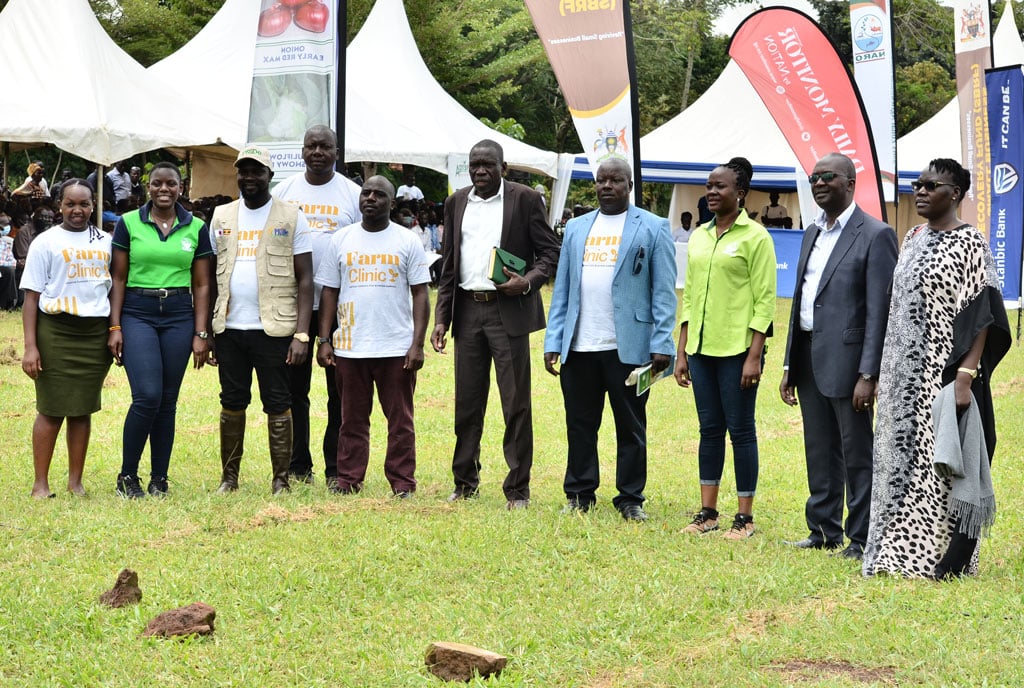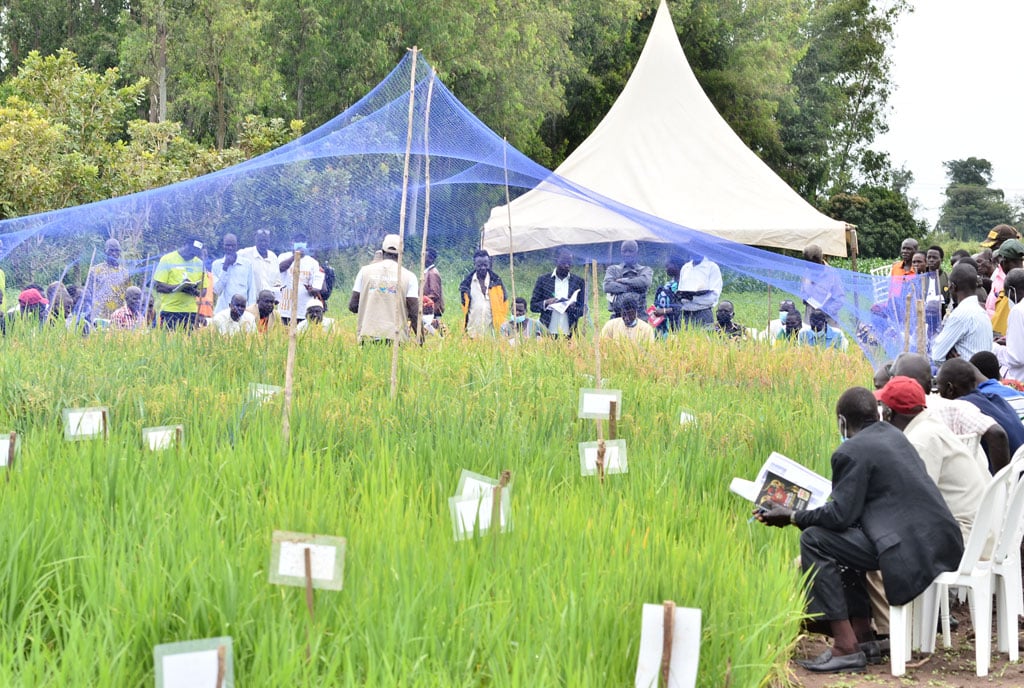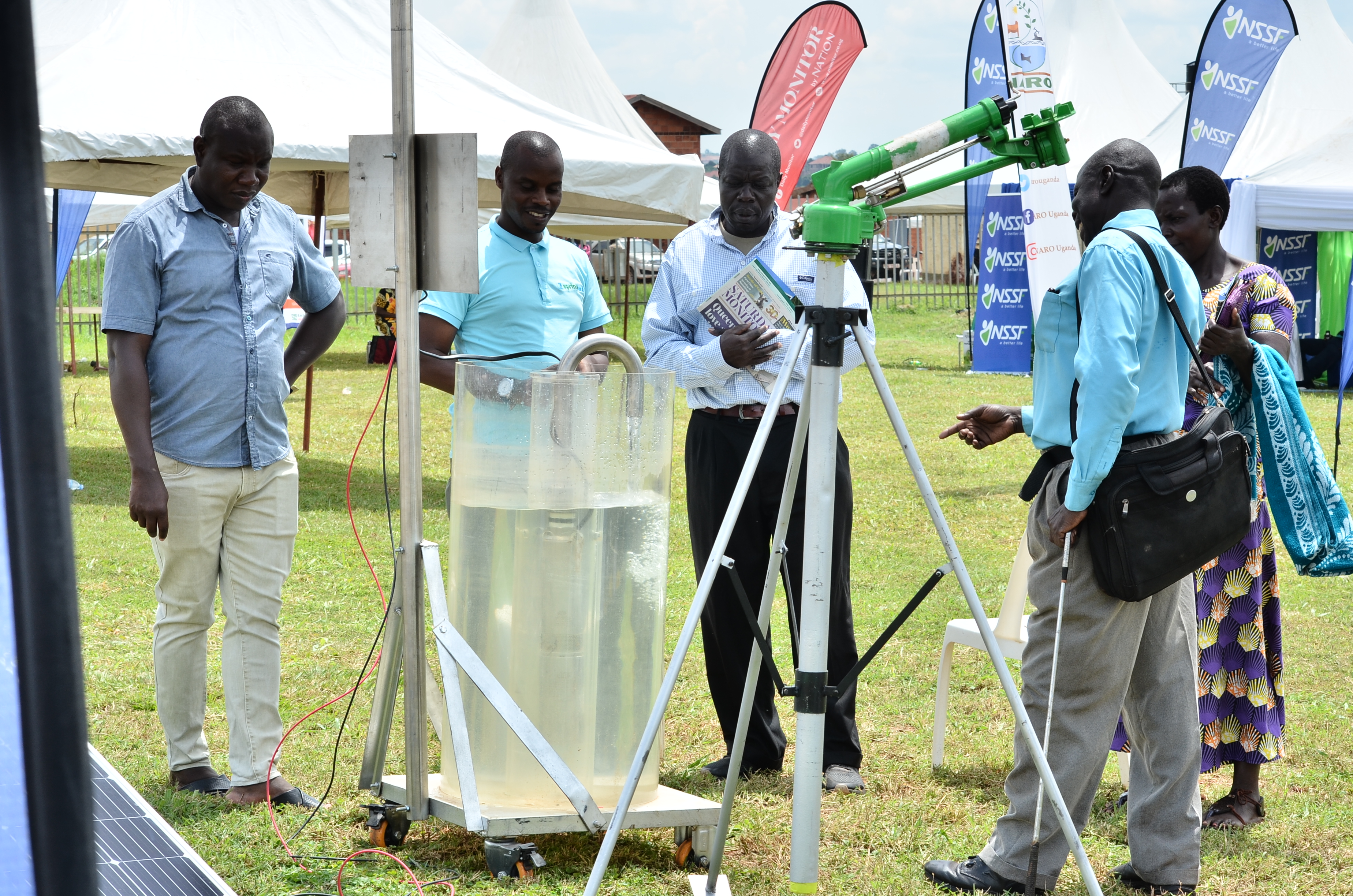Monitor Farm Clinic highlights latest research, solutions

A group of Naro experts who trained farmers on October 8, 2022. PHOTO/GEORGE KATONGOLE
What you need to know:
- Sponsored by the Chinese Embassy, NSSF, Bank of Uganda, Stanbic Bank, Zoetis, farmers were taken through sessions of upland rice cultivation, fish farming, cassava production, dairy with emphasis on feeding and profitable soybean farming.
Hunger is increasing, so is poverty. This is made worse by unpredictable climatic changes that are affecting agricultural production significantly. The outlook is really grim. But researchers assure farmers help is on the way.
During the Seeds of Gold Farm Clinic at the Ngetta Zonal Agricultural Research and Development Institute (Ngetta Zardi) in Lira District, Naro Deputy Director General, Agriculture Technology Promotion, Dr Sadick Kassim told hundreds of farmers at the penultimate event of the year that using approved methods is the way to benefit from farming.
“Our vision is to have a competitive society supported by a dynamic agricultural system,” Dr Kassim says.
He explains that farming seasons are changing from two to one which calls for irrigation to cover the gap left by drought.
“We need to adapt to the situation,” he says, referring to Zimbabwe which has one season but is more food secure than Uganda.
He says farmers should embrace research technologies to be able to harvest enough food and handle it well after harvesting.
Dr Laban Turyagyenda, the director of Ngetta Zardi reiterated Naro’s climate change resilient technologies and practices which farmers can sustainably put to use.
He adds that northern Uganda which is prone to droughts is experiencing low productivity of key crops, notably cereals, cassava and potatoes.
“Climate change is also likely to increase diseases in key crops which could be devastating in situations of crop failure or livestock death,” Dr Turyagyenda says.
He emphasised the farmers to adjust in order to improve on grain storage which can help in minimising losses and avoid food insecurity.
Clean seed, quality harvest
Funded by the Chinese Embassy in Uganda, NSSF, Bank of Uganda, Stanbic Bank, Zoetis, farmers were taken through sessions of upland rice cultivation, fish farming, cassava production, dairy with emphasis on feeding and profitable soybean farming.
Participants rotate from station to station every one hour so all of them have the opportunity to learn something new. And for the last half hour, they ask any questions.
Howard Kasigwa, a fish breeder, one of the few the country is left with after the death of Dr Matthew Tenywa Mwanja, talked about the correct way of raising fish in ponds. Farmers were excited with feed by response, a technique he said helps save food.
“A farmer pours in the pond a handful of feed first to assess the feeding mood of the fish,” he says.
Participants also heard about pond fertilisation as a critical part of profitable fish farming. Crop technicians taught farmers on the role of clean seed.
Angella Kyobutungi, who taught about cassava production says clean seed is as important as the harvest itself.
The trio of Horace Okello, Geoffrey Nviiri and Gerald Ayoo, specialists in dairy farming, provided recommendations for proper feed handling in the wake of climate change.
A financial bridge
As for financing challenges facing farmers across the country, financial partners to the Farm Clinic, Bank of Uganda and Stanbic Bank, offered the available affordable solutions.
Joseph Mutaka, the Principal Banking Officer Bank of Uganda says the Agricultural Credit Facility (ACF) unlocks access to credit in areas with communal land tenure and smallholder farmers who are otherwise excluded for lack of collateral to secure credit.
The ACF is administered by the Bank of Uganda with the participating institutions. Small-scale farmers get loans of up to Shs20m.
“With the interest rate fixed at 12 percent per annum, farmers have the freedom to farm without any fears,” Mutaka says.
Sunny Mpaka, the branch manager Stanbic Bank, Lira reiterated the bank’s commitment to offer agricultural loans to farmers on lower interest rates.
Stanbic Bank was declared the best performing commercial bank in disseminating the government-funded ACF loans in 2019. Yet they continue to give agriculture friendly loans.
Mpaka explains that agri-finance loans targeting both large and small-scale holders can ease the burden of farming. She says that projects such as livestock farming, commodity trading, all forms of farming, machinery acquisition, factory set up, and value addition among others, are supported by the bank’s agri finance loans.
To reach the informal market, Mpaka says the bank has set up a digital wallet called FlexiPay to reach the farmers.
Other challenges facing farmers such as lack of pensionable jobs are included in the NSSF Voluntary Membership Plan. This plan provides employers and workers such as farmers not compelled by the NSSF Act the opportunity to save voluntarily for their retirement.
Benefits
Tom Okello, a cage fish farmer, says he depends on extension information to help him succeed. He attended the Farm Clinic to hear about optimising benefits from cage fish farming.
“I have always tried everything they teach. I attend these days so that I can learn more about new techniques and also be able to connect with other farmers. I trust information from the Naro experts because their specialists have already done the research and I benefitted from the information they provided,” he says.




